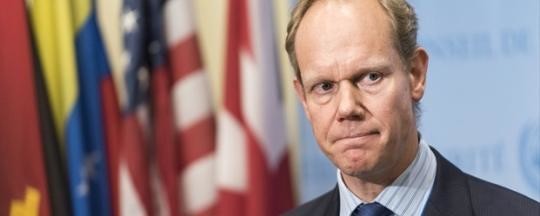A top British diplomat says that the UN Security Council delegation “made progress on three big issues” when they visited Juba earlier this month, suggesting also that the council will not likely impose an arms embargo in view of alleged new ‘commitments’ by the South Sudanese government.
South Sudanese officials have made contradicting statements as to whether they have accepted the entry of a regional force into South Sudan to reinforce the UN Mission in South Sudan (UNMISS).
Ambassador Matthew Rycroft, the UK Permanent Representative to the United Nations, said Wednesday that the United Kingdom has “long called for an arms embargo on South Sudan and we continue to think that that’s the right thing to do,” but on the other hand he suggested that the imposition of an embargo was still conditional and could be avoided.
“Is it time to start discussing an arms embargo yet on South Sudan?” said a journalist in New York.
“Well, the UK has I think today we’ll be interested to hear from Samantha Power and Fodé Seck who led the mission of the Security Council. My deputy was there and we’re very glad to have gone… I think they made progress on three big issues which was commitments from the government of Sudan, first of all on humanitarian access, secondly on removing impediments to UNMISS, the UN mission there, and thirdly accepting the new regional protection force,” the ambassador said.
Rycroft added, “All of those three things are good commitments to have made and now what really matters is that the government of South Sudan abides by those commitments. And it’s important that we as a Security Council make sure that they do that and uphold those commitments. If they don’t then we will come back and discuss the arms embargo again.”
Asked how long the UK will be willing to wait in order for South Sudan to fulfil those commitments he said, “Well, it’s a very urgent situation. The political, economic, humanitarian, all the other situations in South Sudan are incredibly fragile. I don’t think we have any time to lose and I think we should get on with it.”
Related:
What did the UN Security Council achieve in South Sudan?




